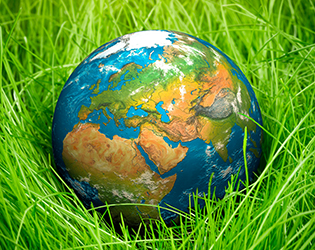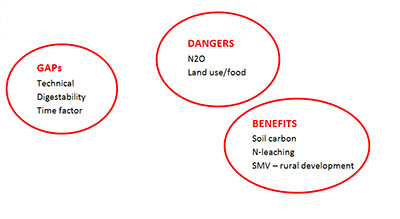Workshop 7: Biorefining - economic & environmental opportunities?
Workshop, Aarhus University, Campus Foulum
Thursday September 15, 2016
Workshop leader: John Hermansen
Background
Production of biomass occupies the scarce resource land and is related with significant costs and environmental impacts. Presently, biomass production is often targeted to specific purposes that request as specific quality at the expense of the volume of biomass. A significant driver for bio-refinery concepts is the opportunities to grow higher yields of biomass and subsequently to ensure the best possible utilization of the different parts of the biomass. Separating biomass into high value proteins for feed, fibres for organic acids, feed or energy, and residues for biogas seems promising from an environmental as well as economic perspectives, but other solutions may as well be promising.

Collaboration subjects identified during the workshop
Grass protein

Incentives/caveats
- Agro-envi measures
- Green criteria – CAP 2020
- Min – minus protein self sufficiency
- Soil carbon payment
- EU SDG plan
- Farm level demonstration
Potential partners and/or competences
- BR NGO (Dan Belusa, Karen Oxenbøll)
- Academia (Morten Gylling, BB Ghaley, Ranjan Parajuli, Heijji Lehtonen)
- DG Agri – DG Climate – DG Research
- Ministers of environment and food (Lasse Juul-Olsen)
Next step
- Clear gaps
- Benefits > dangers
- Work out incentives
Contact
Marie Trydeman Knudsen
Researcher
Department of Agroecology, Aarhus University
M mariet.knudsen@agro.au.dk
P +45 8715 7958
Topic: Fine chemicals
Collaboration subjects identified during the workshop
- Bioplastics
- Biocolorants
- Prebiotics
Potential partners and/or competences
- Chemical engineering (catalytic and cuzimatic specialist, separation)
- Biologist
- Agronomist
- Food and feed ingredients company
- Farmers
- Paint industry
Collaboration subjects identified during the workshop
The economic and environmental performance of different supply chains for bioenergy products
Potential partners and/or competences
- IEA bioenergy
- Utrecht University
- Chalmers University
- EC JRC
- Potsdam Institute for Climate Research
- E.ON or other energy companies
Next step
Further development of the concept
Check funding opportunities, e.g. ERA-Net bioenergy
Contact
Ioanna Mouratiadou
Senior Researcher
University of Utrecht
M i.mouratiadou@uu.nl
P +49 (0) 331 288 2687
Oskar Englund
Post Doc
Chalmers University of Technology
M oskar.englund@chalmers.se
P +46 31 772 31 13